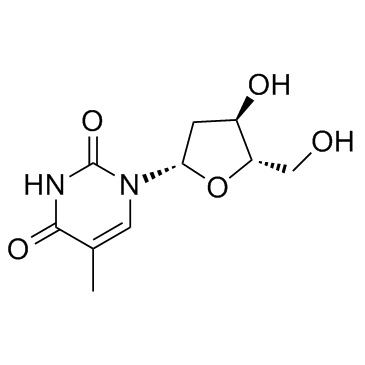Telbivudine

Telbivudine structure
|
Common Name | Telbivudine | ||
|---|---|---|---|---|
| CAS Number | 3424-98-4 | Molecular Weight | 242.229 | |
| Density | 1.5±0.1 g/cm3 | Boiling Point | N/A | |
| Molecular Formula | C10H14N2O5 | Melting Point | 188-190ºC | |
| MSDS | Chinese USA | Flash Point | N/A | |
| Symbol |

GHS07 |
Signal Word | Warning | |
Use of TelbivudineTelbivudine, a specific inhibitor of hepatitis B virus (HBV) replication, is an antiviral drug used in the treatment of hepatitis B infection.Target: HBVTelbivudine is an antiviral drug used in the treatment of hepatitis B infection. It is marketed by Swiss pharmaceutical company Novartis under the trade names Sebivo (Europe) and Tyzeka (United States). Clinical trials have shown it to be significantly more effective than lamivudine or adefovir, and less likely to cause resistance. Telbivudine is a synthetic thymidine nucleoside analogue, it is the L-isomer of thymidine. It is taken once daily.Telbivudine is a potent antiviral that provides effective and sustained viral suppression in patients with compensated CHB. In clinical trials, treatment outcomes were improved significantly more with telbivudine 600 mg once daily than with lamivudine 100 mg or adefovir 10 mg once daily, and telbivudine-treated patients had significantly less viral resistance than lamivudine-treated patients. Telbivudine is associated with a medium genetic barrier to resistance and, as patients with undetectable HBV DNA levels have significantly improved outcomes, it is recommended that HBV DNA levels are monitored at week 24 (and 6 monthly thereafter), with the addition of a nucleoside/nucleotide analogue without cross resistance (such as adefovir dipivoxil) if viraemia is present to reduce the risk of resistance (Roadmap concept). Telbivudine was generally well tolerated in clinical trials for periods of up to 4 years, and has a similar tolerability profile to that of lamivudine. |
| Name | telbivudine |
|---|---|
| Synonym | More Synonyms |
| Description | Telbivudine, a specific inhibitor of hepatitis B virus (HBV) replication, is an antiviral drug used in the treatment of hepatitis B infection.Target: HBVTelbivudine is an antiviral drug used in the treatment of hepatitis B infection. It is marketed by Swiss pharmaceutical company Novartis under the trade names Sebivo (Europe) and Tyzeka (United States). Clinical trials have shown it to be significantly more effective than lamivudine or adefovir, and less likely to cause resistance. Telbivudine is a synthetic thymidine nucleoside analogue, it is the L-isomer of thymidine. It is taken once daily.Telbivudine is a potent antiviral that provides effective and sustained viral suppression in patients with compensated CHB. In clinical trials, treatment outcomes were improved significantly more with telbivudine 600 mg once daily than with lamivudine 100 mg or adefovir 10 mg once daily, and telbivudine-treated patients had significantly less viral resistance than lamivudine-treated patients. Telbivudine is associated with a medium genetic barrier to resistance and, as patients with undetectable HBV DNA levels have significantly improved outcomes, it is recommended that HBV DNA levels are monitored at week 24 (and 6 monthly thereafter), with the addition of a nucleoside/nucleotide analogue without cross resistance (such as adefovir dipivoxil) if viraemia is present to reduce the risk of resistance (Roadmap concept). Telbivudine was generally well tolerated in clinical trials for periods of up to 4 years, and has a similar tolerability profile to that of lamivudine. |
|---|---|
| Related Catalog | |
| References |
| Density | 1.5±0.1 g/cm3 |
|---|---|
| Melting Point | 188-190ºC |
| Molecular Formula | C10H14N2O5 |
| Molecular Weight | 242.229 |
| Exact Mass | 242.090271 |
| PSA | 104.55000 |
| LogP | -1.11 |
| Index of Refraction | 1.584 |
| Storage condition | 2-8°C |
|
Cell Fusion Connects Oncogenesis with Tumor Evolution.
Am. J. Pathol. 185 , 2049-60, (2015) Cell fusion likely drives tumor evolution by undermining chromosomal and DNA stability and/or by generating phenotypic diversity; however, whether a cell fusion event can initiate malignancy and direc... |
|
|
In vitro activity and resistance profile of samatasvir, a novel NS5A replication inhibitor of hepatitis C virus.
Antimicrob. Agents Chemother. 58(8) , 4431-42, (2014) The hepatitis C virus (HCV) nonstructural 5A (NS5A) protein is a clinically validated target for drugs designed to treat chronic HCV infection. This study evaluated the in vitro activity, selectivity,... |
|
|
Telbivudine therapy may shape CD4(+) T-cell response to prevent liver fibrosis in patients with chronic hepatitis B.
Liver Int. 35(3) , 834-45, (2015) Nucleos(t)ide analogues (NAs) can indirectly restore host immunity against hepatitis B virus (HBV) by inhibiting virus replication. We aimed to investigate whether telbivudine could prevent HBV-relate... |
| L-Deoxythymidine |
| 2'-DEOXY-L-THYMIDINE |
| Epavudine |
| L-Dt |
| NV 02B |
| Telbivudine |
| L-2'-deoxythymidine |
| Β-L-2'-DEOXY-THYMIDINE |
| β-L-Thymidine |